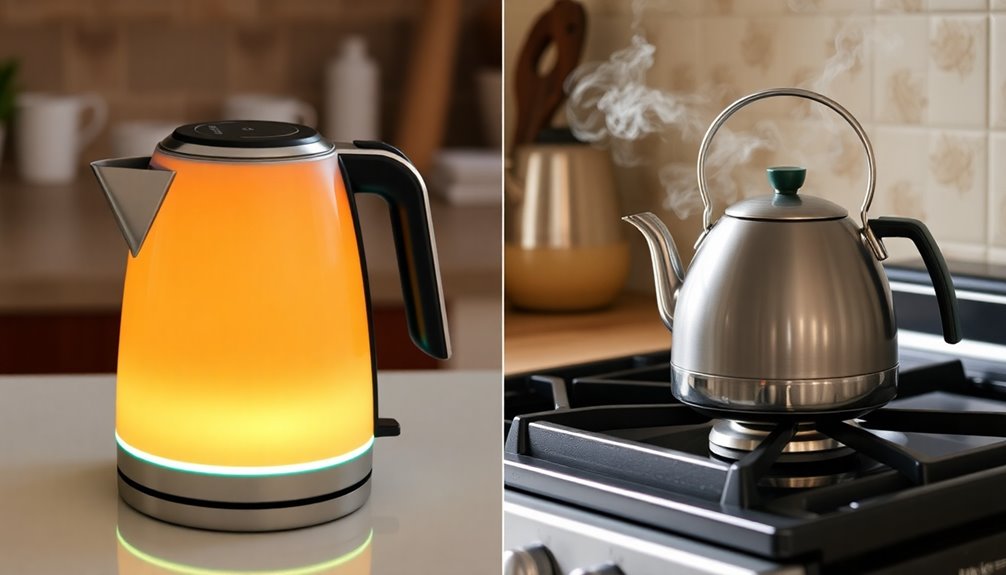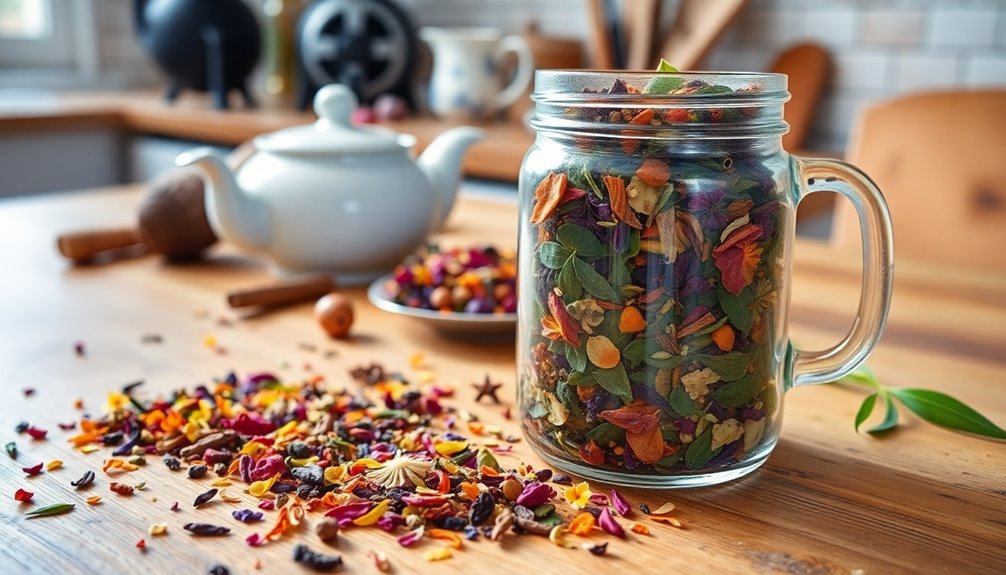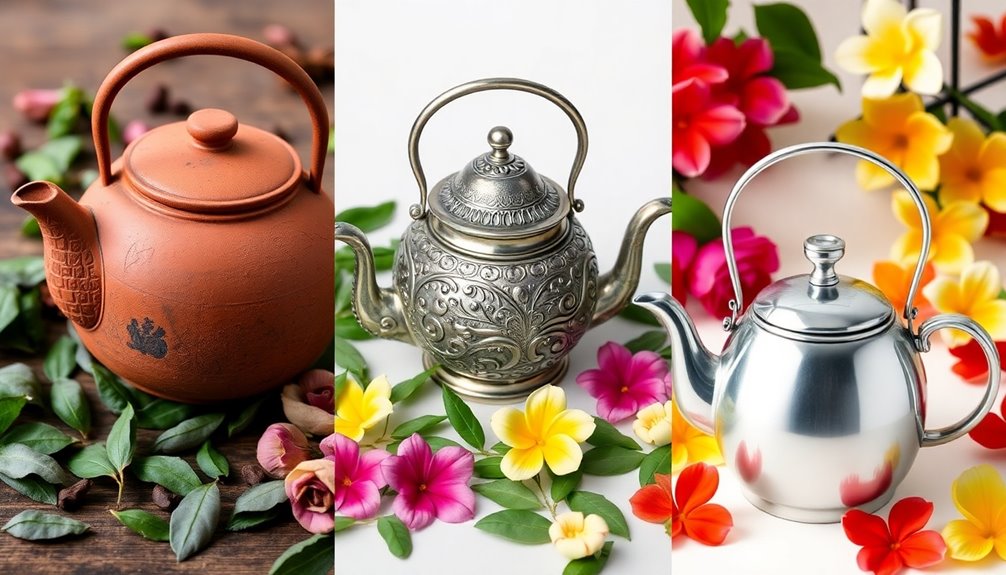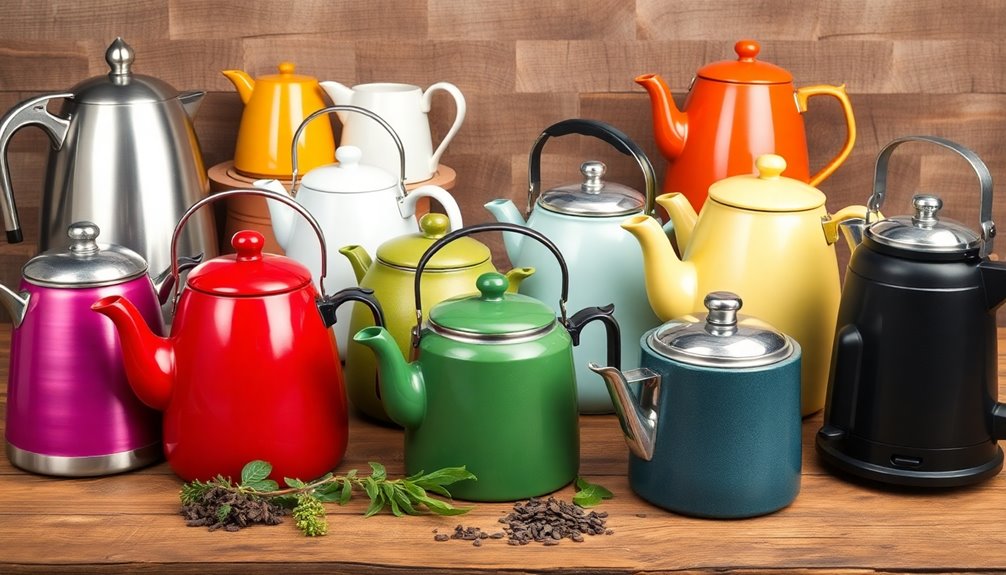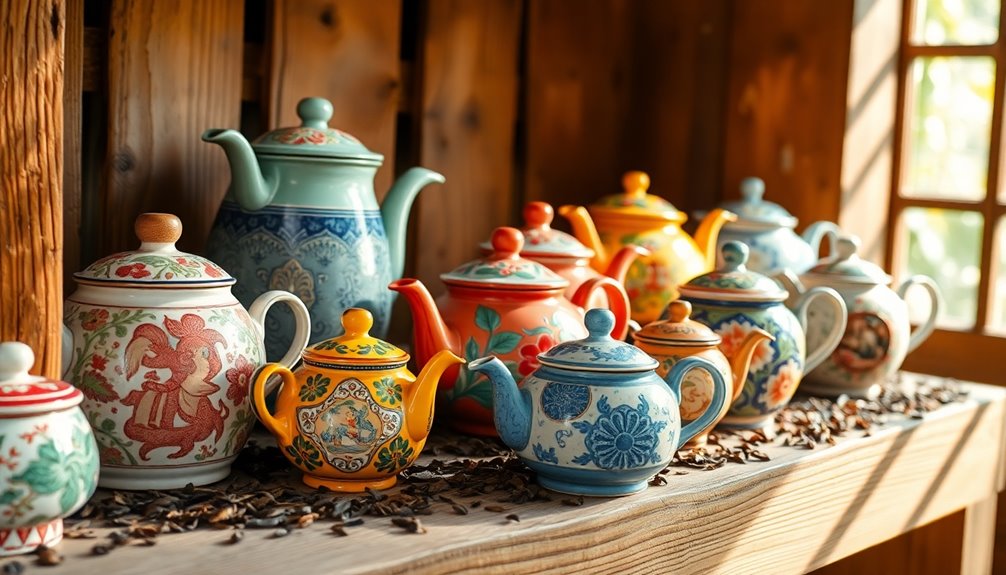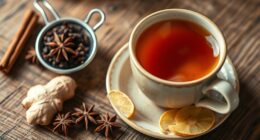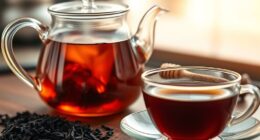When deciding between electric and stovetop kettles for brewing tea, consider speed and flavor. Electric kettles boil water in just 3-5 minutes, perfect for a quick cup. They often let you choose precise temperatures, enhancing tea flavor without bitterness. In contrast, stovetop kettles can take longer, about 5-10 minutes, but they offer a nostalgic brewing experience. They reach a nice rolling boil, which is great for hearty teas needing higher temperatures. Ultimately, if you love convenience and exact temperatures, electric kettles may be best. However, some prefer the charm of stovetops. You'll discover even more key details soon!
Key Takeaways
- Electric kettles boil water faster (3-5 minutes) than stovetop kettles (5-10 minutes), making them more efficient for quick tea preparation.
- Precise temperature control in electric kettles optimizes flavor extraction, while stovetop kettles lack this feature, risking bitterness in delicate teas.
- Electric kettles often include water filtration systems, enhancing taste, whereas stovetop kettles do not offer this advantage.
- Stovetop kettles provide a nostalgic experience and are typically more durable, appealing to those who enjoy traditional brewing methods.
- Portability of electric kettles allows for easy use in various settings, appealing to users prioritizing convenience and speed in tea brewing.
Introduction
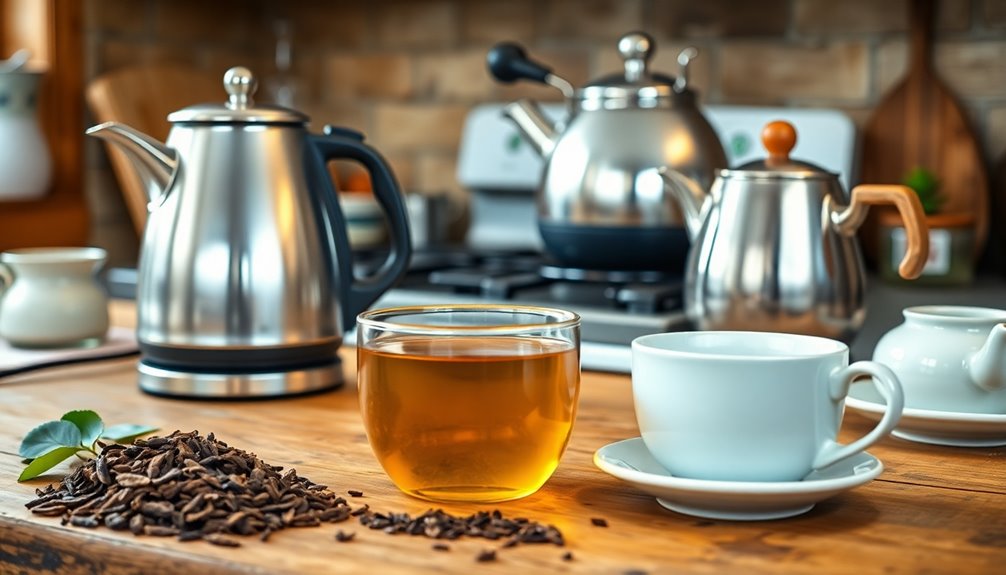
When brewing tea, you often find yourself weighing the benefits of different kettle types. Electric kettles and stovetop kettles each have their unique advantages.
Electric kettles are known for their speed, usually boiling water in just 3-5 minutes. This quick preparation is perfect for those busy mornings or spontaneous tea breaks. Plus, many electric kettles come with temperature control settings, letting you brew different types of tea at their ideal temperatures.
On the other hand, stovetop kettles take a bit longer, typically 5-10 minutes, but they can produce a rolling boil and maintain water temperature for serving. This feature can be great for certain tea types that thrive on prolonged heat.
Safety is another important factor. Electric kettles often include automatic shut-off mechanisms, preventing overheating and making them safer to use. Stovetop kettles, however, require you to keep an eye on them to avoid boiling over.
Ultimately, your choice between electric and stovetop kettles depends on your user preferences. If you value speed and convenience, electric kettles might be the way to go. If you appreciate traditional brewing methods, a stovetop kettle could be your best friend.
Kettle Types Affect Tea Flavor

The type of kettle you choose can greatly influence the flavor of your tea, as each kettle has its own brewing characteristics.
Electric kettles are fantastic for achieving precise temperatures, allowing you to hit the optimal brewing temperatures for different types of tea. This precision enhances flavor extraction and helps prevent bitterness. Many electric kettles even come with temperature settings designed specifically for various teas, ensuring that delicate green teas are brewed at lower temperatures while black teas can steep nicely at higher temperatures. Additionally, using an electric kettle can provide high refresh rates that ensure water boils quickly and efficiently. Furthermore, the use of advanced technology in electric kettles can lead to energy efficiency during the boiling process, which is an added benefit. Moreover, electric kettles often feature filter systems that help remove impurities, further enhancing the taste of your tea.
On the other hand, stovetop kettles can boil water, but they lack the ability to maintain specific temperatures. This can lead to overboiling, which might ruin the delicate flavors of specialty teas. When a stovetop kettle reaches a rolling boil that exceeds the boiling point, it creates a less controlled brewing environment. Additionally, using an electric kettle with HEPA filters can contribute to a cleaner brewing experience by reducing airborne pollutants that may affect the tea's taste.
In the end, your choice of kettle can significantly impact your overall tea experience. With electric kettles, you get consistency and a tailored approach, while stovetop kettles may leave you guessing.
Brewing Temperature Impacts Tea Quality
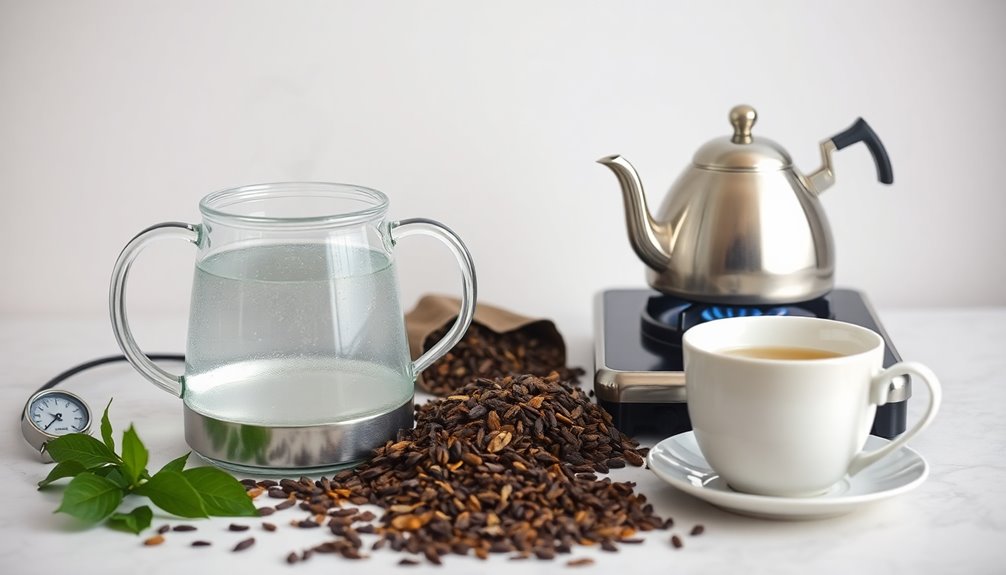
Brewing Temperature Impacts Tea Quality
Choosing the right kettle affects not just the brewing experience but also the quality of your tea. Different types of tea require specific brewing temperatures for optimal flavor. For instance, Japanese green teas are best brewed between 160°F to 170°F, while French press coffee needs about 195°F.
Electric kettles shine here, as they often come with preset temperature settings that let you achieve the ideal brewing temperature. This precise temperature control enhances flavor extraction and helps reduce bitterness, leading to a better tea experience. Additionally, online courses can help you learn more about the nuances of brewing tea to elevate your skills. Furthermore, using butter alternatives like clarified butter can enhance the flavor of snacks served alongside your tea. Moreover, using low-fat or dairy-free options in your snacks can contribute to overall health, mirroring the benefits of precise brewing in tea. The ability to brew tea at ideal steeping time is crucial for achieving the best flavor profile.
On the other hand, stovetop kettles typically only indicate boiling point. This lack of precise temperature control can make it challenging to brew delicate teas properly. If your kettle boils water without offering specific temperature settings, you might miss out on the true flavor and aroma of your tea.
Using an electric tea kettle with precise temperature options allows you to customize brewing conditions, ensuring that each cup is brewed just right. This not only improves the quality of your tea, but it also makes every sip more enjoyable! Additionally, the mechanics of French press coffee brewing can provide insights into how different methods affect flavor, which can be beneficial for tea enthusiasts as well.
Tea Enthusiasts Prefer Stovetop Kettles
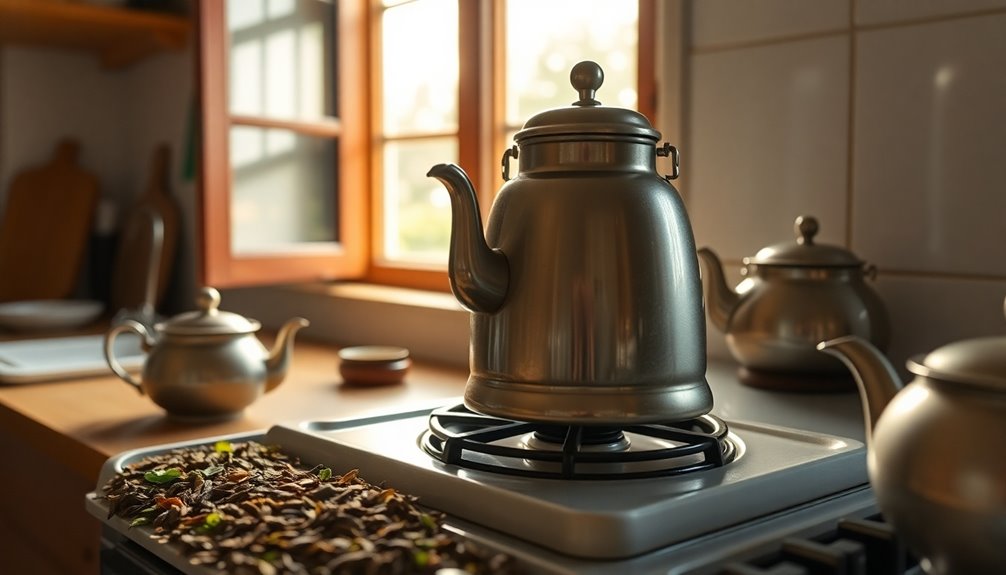
While many might lean towards electric kettles for their convenience, tea enthusiasts often swear by stovetop kettles for their unique advantages. One major reason is that stovetop kettles can produce a rolling boil, which is ideal for brewing tea that needs higher temperatures. You'll find that some specialty teas really thrive on precise temperature control, and stovetop kettles can heat water above the boiling point for this very purpose. Additionally, the use of boiling water around 200°F (93°C) can enhance the flavor of teas like rooibos. Furthermore, a stovetop kettle allows for optimal performance by ensuring the water reaches the desired temperature efficiently. Moreover, using diversification in your tea selection can lead to discovering new flavors and benefits.
Another appealing aspect is the traditional charm they bring to your kitchen. The nostalgic whistle that signals your water is ready adds a delightful touch to the brewing experience.
Plus, stovetop kettles are often made from durable materials like stainless steel, ensuring they last for years while providing a sleek look.
Without electrical components, stovetop kettles are easier to clean and maintain. This simplicity is something many tea enthusiasts appreciate. Additionally, the act of boiling water on the stove allows you to engage in a more hands-on approach to the brewing process, enhancing your overall tea experience.
If you value quality craftsmanship and a more hands-on approach to brewing tea, choosing a stovetop kettle could be the perfect fit for you. It's not just about making tea; it's about enjoying the entire experience!
Brewing Consistency and Control
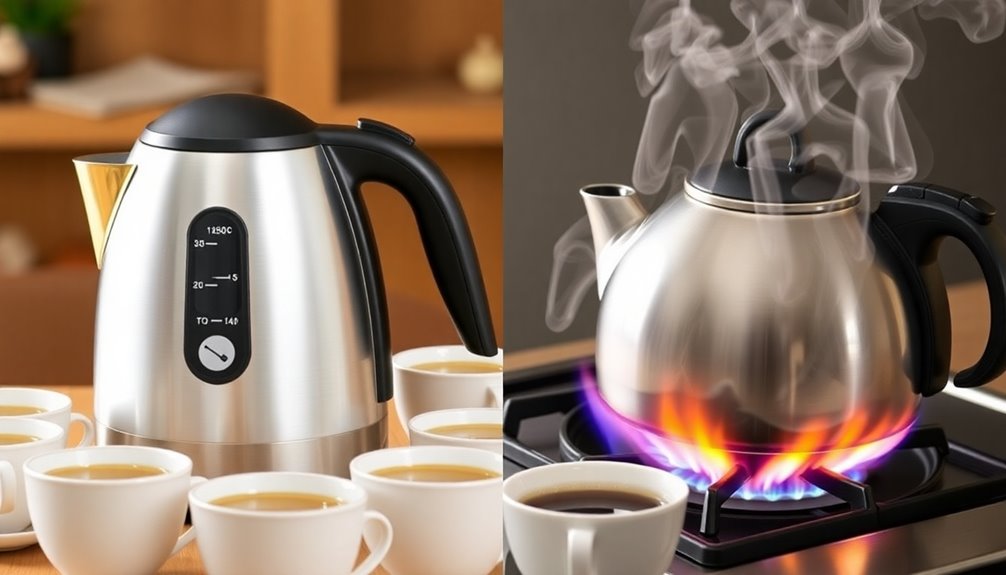
Stovetop kettles may offer a charming, hands-on experience, but when it comes to brewing consistency and control, electric kettles truly shine. With electric kettles, you can enjoy precise temperature control, allowing you to set specific temperatures for different types of tea. This is important because each tea requires optimal brewing conditions to bring out its best flavor profile.
Unlike stovetop kettles, which usually just signal when the water reaches the boiling point, electric kettles help you avoid over-extraction and bitterness in delicate teas. Their ability to maintain a consistent temperature for extended periods means you can brew multiple cups of tea without needing to reheat the water.
Many electric kettles also come with programmable settings, enabling you to achieve brewing consistency that's hard to match with stovetop kettles. This advanced technology helps you replicate the same flavor profile in every cup.
Practical Applications
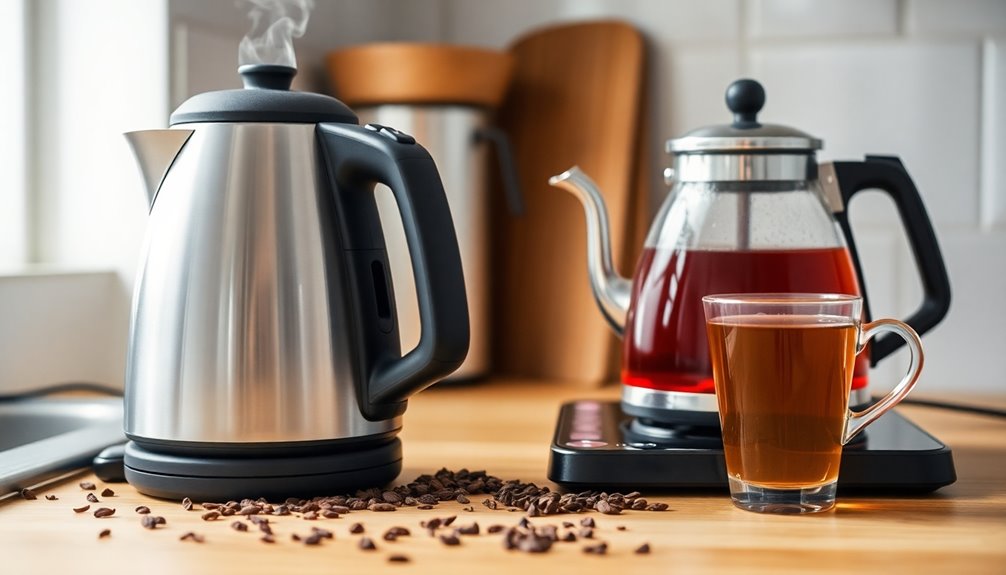
When it comes to practical applications, electric kettles offer unparalleled convenience for tea enthusiasts. They typically boil water in just 3-5 minutes, making them perfect for quick tea preparation. If you're busy and need a fast brew, electric kettles will save you time compared to stovetop kettles, which can take 5-10 minutes.
Plus, electric kettles often come with precise temperature control, allowing you to select the right setting for different types of tea. This means you can enhance flavor extraction and enjoy a better brewing experience.
While stovetop kettles are great for producing a rolling boil, electric kettles shine in efficiency and portability. You can use them anywhere with an electrical outlet, whether in the kitchen or outside during a picnic.
Both kettle types serve the purpose of boiling water for tea, but electric kettles truly excel in convenience. They let you focus more on enjoying your tea rather than waiting for water to boil.
Frequently Asked Questions
Is a Stove Kettle Better Than an Electric Kettle?
When considering whether a stovetop kettle's better than an electric one, you'll find that stovetop models offer durability and flexibility, allowing you to control the boiling process, though they may lack precise temperature settings.
What Are the Disadvantages of an Electric Kettle?
Electric kettles have several disadvantages: they can't function during power outages, cost more upfront, are harder to repair, require counter space, and often have shorter lifespans compared to the more durable stovetop models.
Should You Brew Tea in an Electric Kettle?
If you're brewing tea, an electric kettle's precise temperature control and quick boiling time make it a great choice. It's convenient, safe, and lets you enjoy multiple cups without constantly reheating water.
What Are the Advantages of Stovetop Kettles?
Stovetop kettles offer versatility, durability, and portability. You can enjoy precise temperature control, easily heat water above boiling point, and simplify cleaning without electronic parts. Plus, they're perfect for outdoor adventures or cozy settings at home.
Conclusion
In the end, choosing between electric and stovetop kettles really comes down to your personal preferences. If you love control and the best flavor, a stovetop kettle might be your best bet. But if you're all about speed and convenience, an electric kettle could be perfect for you. Whichever you choose, remember that the right kettle can make your tea experience even better. Enjoy your brewing adventures, and happy sipping!

